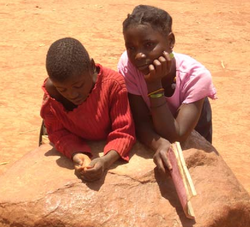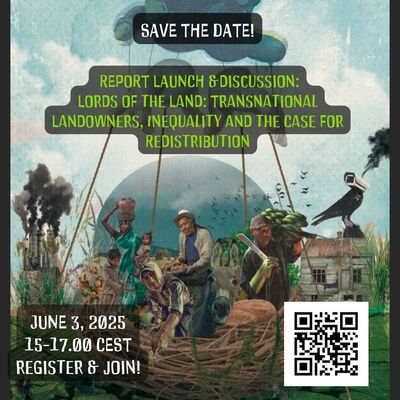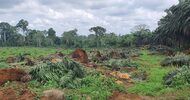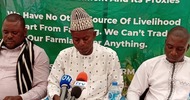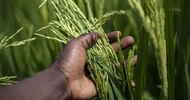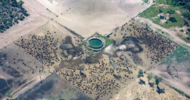JA/UNAC | 27 July 2011 (launch) | Português
Lords of the land: Preliminary analysis of the phenomenon of land grabbing in Mozambique
Case Studies
Justiça Ambiental & União Nacional de Camponeses
Maputo, Mozambique
March 2011
Download the PDF (1.8MB)
Abstract
The term ‘usurpation’ refers to the action of crafty or violent appropriation of something which is legitimately owned by someone else and is therefore; taken without right, acquired by fraud, or illegally possessed. The term is used to describe the global phenomenon of “land grabbing”, such as the rent or purchase of vast extensions of land in poorer developing countries (as is the case of Mozambique) by richer countries with food insecurity and by private investors of those same countries so as to produce or explore diverse goods for export.
The present study reiterates the fact that agriculture constitutes half of the predominant subsistence of the rural communities following mixed farming (agriculture and cattle), both of which are extremely dependent on the availability of fertile land and water . Additionally these communities depend on the rivers as a primary source of water and a large number of the analysed projects are located close to this resource. The increase of areas occupied by big projects will certainly have a big impact in terms of availability and access to land and water, exacerbating their already precarious state of poverty.
The majority of the big projects analysed are recent, belong to foreign investors, and fall within the agri-business, tourism and mining sectors. The analysed investments have created more conflicts and aggravated the poverty, deficits and vulnerability of the rural communities. Investors of Nordic countries, despite upholding elevated standards of respect for human rights and the processes of public participation in the event of initiatives which present potential social and environmental impacts in their own countries, do not behave similarly or uphold the same standards in Mozambique. Their practices feed a corrupt local system and they benefit from existing failures in the implementation of current laws and in this way aggravate the already precarious living conditions of rural communities.
One of the requirements of the attribution of rights to usage and profit of land is the realisation of a session of public consult, which has been verified as having often failed and/or occurred in an improper way which seriously damages rights to information and public participation through the manipulation of communities by investors with false promises very often executed through the local power structures. Many of the current conflicts between the communities and businesses, invasion of community land and resettlement in improper conditions and locations, are the result of unfulfilled promises made during the process of public consult.
The phenomenon of land grabbing in Mozambique is facilitated by numerous failures throughout the process of the attribution of the Right of Land Usage, benefiting the investors and detrimental to the rural communities. Some of the factors which contribute to the phenomenon of land grabbing include; the institutional weakness of local government, the corrupt nature of community authorities and leaders, and the lack of awareness on the benefits of the formal processes of land tenure. The most aggravating factor of this phenomenon is the vulnerability resulting from the numerous needs characteristic of poverty to which these communities are subject which in turn means they are easily duped with promises of a better set of basic living conditions.
Lords of the land: Preliminary analysis of the phenomenon of land grabbing in Mozambique
Case Studies
Justiça Ambiental & União Nacional de Camponeses
Maputo, Mozambique
March 2011
Download the PDF (1.8MB)
Abstract
The term ‘usurpation’ refers to the action of crafty or violent appropriation of something which is legitimately owned by someone else and is therefore; taken without right, acquired by fraud, or illegally possessed. The term is used to describe the global phenomenon of “land grabbing”, such as the rent or purchase of vast extensions of land in poorer developing countries (as is the case of Mozambique) by richer countries with food insecurity and by private investors of those same countries so as to produce or explore diverse goods for export.
The present study reiterates the fact that agriculture constitutes half of the predominant subsistence of the rural communities following mixed farming (agriculture and cattle), both of which are extremely dependent on the availability of fertile land and water . Additionally these communities depend on the rivers as a primary source of water and a large number of the analysed projects are located close to this resource. The increase of areas occupied by big projects will certainly have a big impact in terms of availability and access to land and water, exacerbating their already precarious state of poverty.
The majority of the big projects analysed are recent, belong to foreign investors, and fall within the agri-business, tourism and mining sectors. The analysed investments have created more conflicts and aggravated the poverty, deficits and vulnerability of the rural communities. Investors of Nordic countries, despite upholding elevated standards of respect for human rights and the processes of public participation in the event of initiatives which present potential social and environmental impacts in their own countries, do not behave similarly or uphold the same standards in Mozambique. Their practices feed a corrupt local system and they benefit from existing failures in the implementation of current laws and in this way aggravate the already precarious living conditions of rural communities.
One of the requirements of the attribution of rights to usage and profit of land is the realisation of a session of public consult, which has been verified as having often failed and/or occurred in an improper way which seriously damages rights to information and public participation through the manipulation of communities by investors with false promises very often executed through the local power structures. Many of the current conflicts between the communities and businesses, invasion of community land and resettlement in improper conditions and locations, are the result of unfulfilled promises made during the process of public consult.
The phenomenon of land grabbing in Mozambique is facilitated by numerous failures throughout the process of the attribution of the Right of Land Usage, benefiting the investors and detrimental to the rural communities. Some of the factors which contribute to the phenomenon of land grabbing include; the institutional weakness of local government, the corrupt nature of community authorities and leaders, and the lack of awareness on the benefits of the formal processes of land tenure. The most aggravating factor of this phenomenon is the vulnerability resulting from the numerous needs characteristic of poverty to which these communities are subject which in turn means they are easily duped with promises of a better set of basic living conditions.


